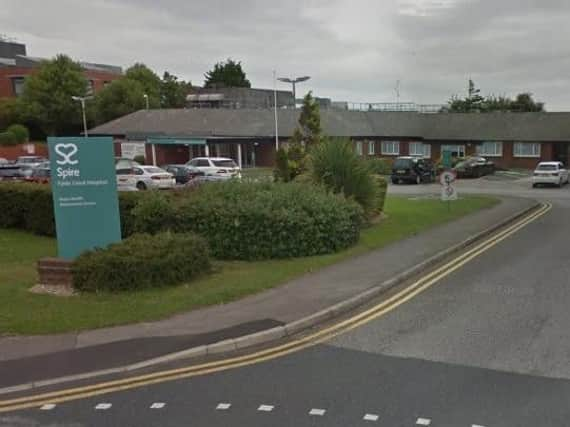Hundreds of Blackpool patients transferred from NHS to private hospital in bid to beat cancer waiting time targets


Some 300 people waiting for various minor procedures were moved to the Spire Hospital in St Walburga’s Road to help the trust running Blackpool Victoria Hospital try and meet its urgent GP referral and 62-day targets.
Dr Amanda Doyle (inset), accountable officer for Blackpool and Fylde and Wyre Clinical Commissioning Groups (CCGs), which are responsible for organising and paying for residents’ health care, said: “We do all we can to ensure patients are referred to high quality services within set time frames.
Advertisement
Hide AdAdvertisement
Hide Ad"Working together with partners across the Fylde coast, the decision was made to transfer a number of routine elective cases to Spire Fylde Coast to free up capacity and access to timely appointments for cancer patients.”
The CCGs pay Spire to take a certain number of patients every year, and this move will not cost extra on top, a spokesman told The Gazette.
Government targets say patients with suspected cancer should be seen by a cancer specialist within a maximum of two weeks and a maximum of two months – or 62 days – from urgent referral for suspected cancer to the first bout of treatment. Two-month targets are also in place for referrals from an NHS cancer screening service to first definitive treatment, and from a consultant’s decision to upgrade a patient’s priority.
Blackpool Teaching Hospitals achieved its one month target for diagnosis to treatment, its 62-day upgrade target, and two breast cancer targets last year, but missed its general 62-day target from GP urgent referral to treatment (82.75 per cent against a target of 85), and the 62 day target from screening service to treatment (77.45 per cent against a target of 90).
Advertisement
Hide AdAdvertisement
Hide Ad“Patients choosing to delay their appointment or treatment makes achievement of the target more difficult, and there is no adjustment for the waiting times even when a patient defers treatment,” a spokesman said.
The trust said in documents “peaks in referral rates, predominantly driven by national cancer campaigns and seasonality, and increased case complexity” were expected to continue this year.
And the Victoria Hospital’s interim director of planned care, Janet Barnsley, said the latest “quarterly position for the cancer targets had yet to close and, at present, the trust data indicated the organisation would not meet the urgent GP referral targets and the 62-day targets”, minutes from the latest trust board meeting showed.
They added: “Mrs Barnsley stated as a mitigation 300 patients would be transferred to the Spire Hospital to assist with trust activity.”
Advertisement
Hide AdAdvertisement
Hide AdWhen asked by non-executive director Mary Whyham what the financial implications would be, Mrs Barnsley said “no cost would be incurred by the trust as the activity would be funded through the CCGs”.
Mrs Whyham also “questioned whether the trust was under-performing on the cancer targets and Mrs Barnsley stated patient choice was significantly affecting the trust’s performance”.
The trust said extra cash had been secured from NHS England and the charity Macmillan Cancer Support to help improve waiting times, while electronic referrals for all urgent cases were also being implemented.
Spire, one of 38 private hospitals run by Spire Healthcare UK, offers a range of services including scans and x-rays, surgery, including plastic, cosmetic and obesity, and physiotherapy.
Advertisement
Hide AdAdvertisement
Hide AdThe patients moved there "were transferred, with their agreement for a range of orthopaedic, general surgery and gynaecology treatments," a spokeswoman for Blackpool Teaching Hospitals said.
She added: "There are no financial penalties for non-achievement of the 62-day target, but trusts are put under significant scrutiny for failing to reach these standards.
"Meeting cancer targets can be challenging because of patient choice and the complexity of their pathways."